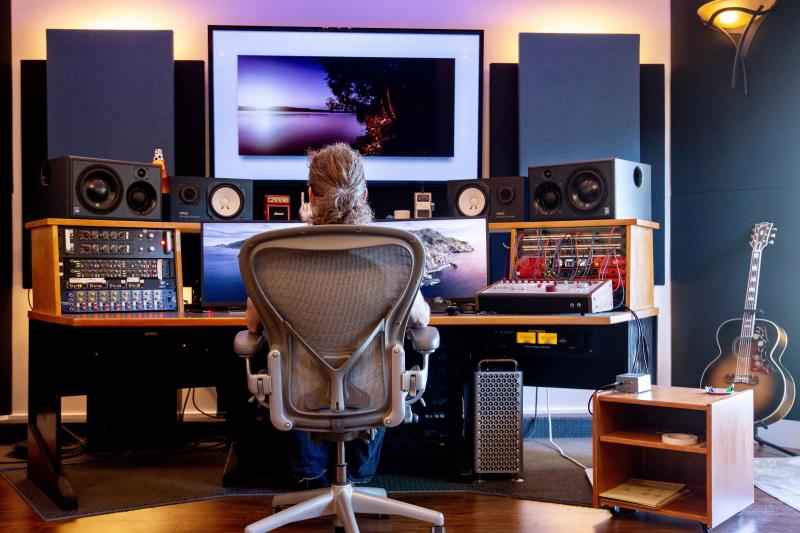Brian Howes relies on Focusrite Interfaces

If Brian Howes ever gets tired of making hits, he can wander down the lane from his home studio on Vancouver Island and catch some salmon. But considering the fact that his talents remain in demand, the salmon will likely be safe for a while. The GRAMMY-nominated Vancouver native is the recipient of BMI, SOCAN, Juno, and Dove awards. His work portfolio includes producing Nickelback’s multi-platinum album Here And Now, including the singles “Trying Not To Love You” and “Lullaby”; co-writing Daughtry hits including “Over You” and “What I Want” from his multi-platinum debut album; co-writing and producing Hinder’s number-one single “Lips Of An Angel”; co-writing and producing on all seven of Canadian pop/rock outfit Hedley’s albums, which garnered him multiple wins as Juno Producer Of The Year and Best Pop Album; as well as additional projects with Boys Like Girls, Taylor Swift, Mother Mother, Chris Cornell and countless others.
The earthy tones and natural light of Howes’s studio – designed by Ron “Obvious” Vermeulen, whose designs for personal studios like Bryan Adams’ The Warehouse and Jim Vallance’s Armoury Studios has made a him an acoustical legend in the Northwest – make it a comfortable place to work. Howes describes it as “a nice basement, with the best gear in the world!” But it’s also an easy, streamlined environment, thanks to an assortment of Focusrite interfaces installed there. A 64-in/64-out Pro Tools | HD and dual Thunderbolt 3 Red 16Line is the studio’s main interface. An ISA 828 MkII incorporates eight of the classic mic preamps – with Lundahl LL1538 transformers on every input – that have made Howes a lifelong fan of the Focusrite brand. And a RedNet A16R MkII 16-channel analogue I/O interface is the hub for a future expansion of Dante networking in the studio, utilizing cabling that the designer planned and provided for. Focusrite provides Howes with both reliable networked connectivity within the studio’s signal-path infrastructure and classic tonality for every microphone input.
“The Focusrite products are very easy to work with,” says Howes, who played in the British Columbia-based band Young Guns; later fronted the group DDT, which blended punk, ska, and rap; and then formed the alternative rock band Closure in 2002 before moving full time into music production. “I tend to be a big-picture-type producer. I listen to the song and the artist. I understand the basics of the technology, but my approach has more to do with the feel and the vibe and the sound than technical wizardry. I have a great engineer I work with, Karl Dicaire, who handles the technical aspects, and that lets me focus on the creative elements. What I love hearing is music through the Focusrite converters. They work wonderfully on every type of music.”
And that pretty much defines Howes’s musical oeuvre: recent projects that the Focusrite units have been used for at his studio include Florida-based rockers Fame On Fire; Pecos & The Rooftops’ gritty mix of mid-tempo country, folk and straightforward southern rock; and GRAMMY Award-nominated Christian rock band Skillet. “I’m working on projects that range from rock to pop to country to hip-hop, and I’ve got different flavors of gear that help me do that,” he says. “But the Focusrite units are one of the big consistent things across all of that, as well as into the future, with the Dante connectivity the A16R provides. The Focusrite gear makes all the difference.”
 How to resolve AdBlock issue?
How to resolve AdBlock issue?